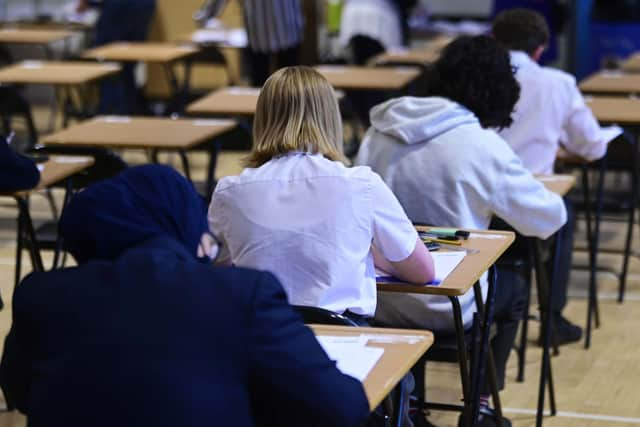Hayward Review: Expert says blueprint to scrap S4 exams in Scotland will benefit pupils, teachers and Scottish society
An academic who has drawn up radical plans to scrap exams for thousands of Scottish school pupils has urged ministers to be "brave" and finally deliver a qualifications model that is fit for the nation’s future.
But Professor Louise Hayward also warned decision makers to “ca’ canny” in order to make sure the reforms she has proposed are properly resourced and delivered with a “very clear vision” of purpose.
Advertisement
Hide AdAdvertisement
Hide AdThe Glasgow University expert spoke to The Scotsman after her blueprint for Scotland’s new assessment system – carried out for the Scottish Government – was unveiled. It recommended ending school exams for S4 pupils and introducing a new Scottish Diploma of Achievement.


After publishing the long-awaited review on Thursday, education secretary Jenny Gilruth announced she would be delaying planned legislation for the creation of new education bodies, including a replacement for the Scottish Qualifications Authority (SQA).
The draft laws will now be on “pause for a year” to allow ministers to properly consider a series of recent reviews, including Prof Hayward’s report.
Ms Gilruth said the Government recognised it must show leadership to address a “new normal” in classrooms in the wake of the Covid-19 pandemic.
In her report, Prof Hayward made 26 recommendations for the future of Scottish school assessments. Speaking to The Scotsman, she said: "If we are brave enough to do this, then I think it’s a better model for learners, it’s a better model for teachers and it’s a much better model for Scottish society."


The academic added: "I think it’s about a system that has served Scotland well in the past, but this review is about looking to the future. And in looking to the future, because things are changing so quickly, we need a much more agile, flexible system, that will support people better in the future.”
The review was announced in October 2021 by former education secretary Shirley-Anne Somerville. The move came amid fresh debate about the future of assessments after exams were cancelled in 2020 and 2021 due to the Covid-19 pandemic.
It also followed a review of Scottish education by the OECD, a paper by Professor Gordon Stobart on possible assessment options, and Angela Morgan’s report on support for learning.
Advertisement
Hide AdAdvertisement
Hide AdThe review was widely expected to herald a move away from the so-called “two term dash”, in which education from S4 to S6 was said to focus less on quality and depth of learning, instead being “almost entirely driven by preparation for examinations”.
Under the recommendations tabled on Thursday, there would be no exams from S1 to S4, with assessment being internal only. External examinations, alongside internal assessment, would remain a part of Higher and Advanced Highers.
"We believe this will result in a reduction in pressure on learners and staff in education settings and will promote opportunities for greater depth in learning,” the review concluded.
The first cohort of learners to be awarded when leaving school could be from 2028 to 2032. The overall diploma would not be graded and it would be awarded when achievements are recognised in each of three key elements – “programmes of learning”, “project learning” and the “personal pathway”.
It would be a live document that could continue to be updated when students enter further or higher education, or employment.
Prof Hayward welcomed the Government’s decision to delay the education reform legislation. "I think that taking a little time to do that right now could really pay off significantly in the longer term,” she said.
But she added it was vital that ministers properly invested in the changes, if they were implemented. "I would say that the report gives the direction of travel – how quickly we get there depends on the level of resource available,” she said.
"The report has recommendations about the content of the Scottish Diploma of Achievement, but it also has a number of recommendations about how to do it, and how to move us from where we are to where we want to be.
Advertisement
Hide AdAdvertisement
Hide Ad"Because in previous innovations in Scotland, often we’ve had very good ideas, but we haven’t necessarily thought through the process to take us from where we are to where we want to be, and as a result we run into difficultly.
"So the idea is, ca’ canny. Have a very clear vision of where we’re going – this is what qualifications and assessment will look like in Scotland in the future. And then look at the resourcing available and then track it out, so that it is done properly over time.”
The Hayward report comes alongside the recent Withers Review of the skills system and the National Discussion on education.
Ms Gilruth said the recommendations for reform “could amount to a radical shift in Scottish education”. However, she said ministers wanted to take time to consider their next steps.
"The culture in our schools has changed post-pandemic, and we know that is impacting on attendance and we also know that schools are responding to a cost-of-living crisis and to other external challenges, from artificial intelligence to global instability,” she said.
"Both the Hayward report and the National Discussion talk to this uncertainty. So government must provide leadership on reform which addresses this new normal in our school communities.
"In evidencing that leadership, I’ve concluded that it is not the time to introduce legislation on educational reform now. Any reform which meets our ambitions for our young people will need to be bold, it will need to be holistic and, crucially, it will have to be shaped by the expertise of our teachers.
"I’m determined to give this process the time needed to ensure that happens, before bringing forward legislation in the next parliamentary year."
Advertisement
Hide AdAdvertisement
Hide AdHowever, Conservative education spokesman Stephen Kerr said Scotland’s education system was in “dire need of reform”. He said: “These reforms must be substantial and cannot just be a superficial paint job – we need to see urgent action now.
"The SNP need to stop kicking the can down the road and Jenny Gilruth must embrace the need for bold, innovative change.”
Andrea Bradley, general secretary of the Educational Institute of Scotland teaching union, said the review’s recommendations to reduce the emphasis on high-stakes exams would “provide space for greater breadth, depth, and enjoyment of learning across all areas of the curriculum”.
She said: “Everyone involved in Scottish education is eager to move forward with positive change, but, as the Hayward Review acknowledges, this will bring additional resource requirements which will require significant additional investment from government. We believe that Scotland’s young people are worth it.”
Concerns have previously been raised about a move away from exams, including by Lindsay Paterson, professor of education policy at Edinburgh University.
He told The Scotsman earlier this month the review process should have been postponed months ago to consult widely on the impact of artificial intelligence (AI) technology.
In her report, Prof Hayward recommended the Scottish Government urgently convene and lead a cross-sector commission to develop a position on AI in education and a set of guiding principles for the use of AI.
Comments
Want to join the conversation? Please or to comment on this article.
